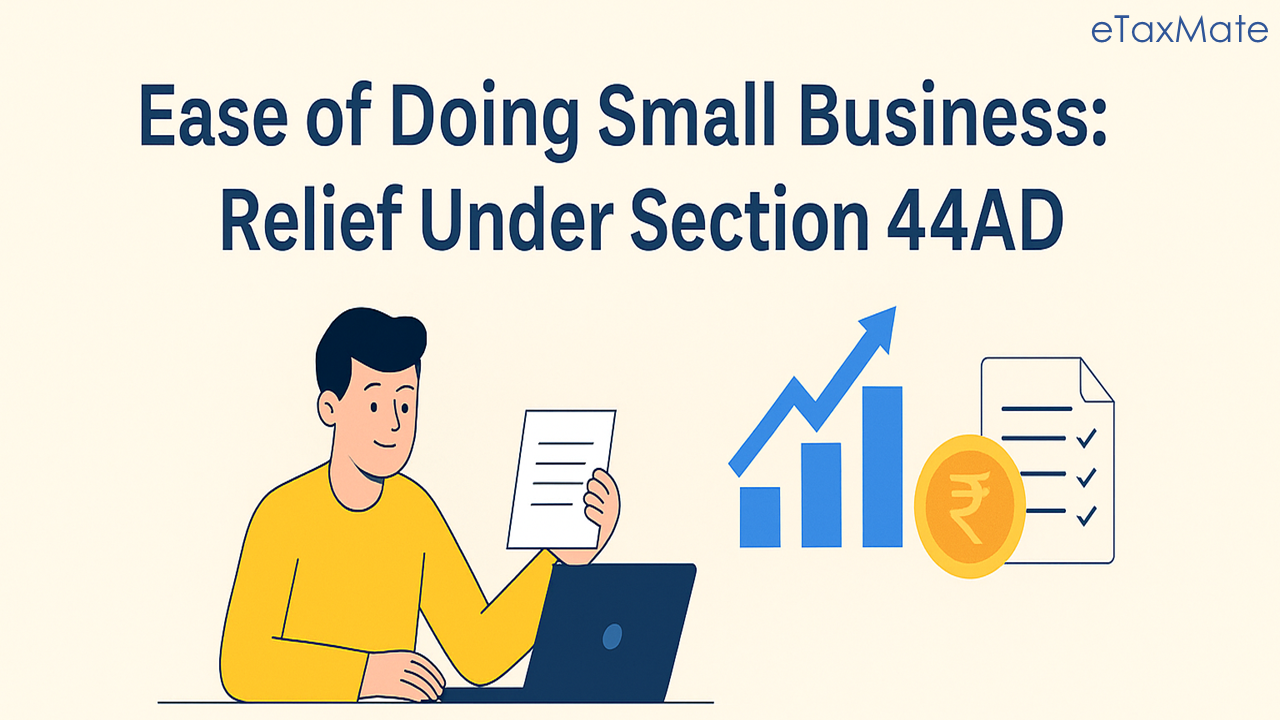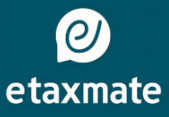
Introduction
Imagine running a small business without the constant worry of maintaining detailed books of accounts. No tension about tracking every rupee of income or expenditure. No anxiety over complicated accounting entries or the stress of balancing ledgers at the end of the year. Instead, all your time and energy goes into what truly matters—growing your business. That’s where Section 44AD of the Income Tax Act, 1961 steps in—a relief specially designed for small businesses. Under this presumptive taxation scheme, eligible businesses can declare income at a fixed percentage of turnover and avoid the burden of maintaining books or getting accounts audited.
This means you can focus on your core business, save on compliance costs, and still meet your tax obligations—all in a simplified manner. In this blog, we’ll walk you through everything you need to know about Section 44AD—who can opt for it, how it works, its benefits, limitations, and filing process—so you can decide if this route is right for your business.
Overriding Sections 28 to 43C of the Income Tax Act, 1961
Section 44AD provides a simplified way of computing income by overriding the detailed provisions from Section 28 to 43C of the Income Tax Act. That means no need to calculate depreciation, disallow expenses, or adjust for various heads—just a flat rate on turnover. But this benefit is available only when both the assessee and the business meet the eligibility criteria.
✅ Who Can Opt for Section 44AD?
To avail the benefit of presumptive taxation under Section 44AD, both the assessee and the business must qualify.
Eligible Assessee:
- Resident Individual
- Resident Hindu Undivided Family (HUF)
- Resident Partnership Firm (excluding LLPs)
🚫 Not eligible if the assessee has claimed deduction under:
- Section 10AA (SEZ units)
Sections 80-IA to 80-RRB (certain specified deductions)
Eligible Business:
- Any business (except the business of plying, hiring or leasing goods carriages covered under Section 44AE)
- Total turnover or gross receipts should not exceed:
- ₹2 crore, or
- ₹3 crore if at least 95% of receipts and payments are through banking channels (i.e., account payee cheques, demand drafts, or digital modes)
💰 Presumptive Income Calculation:
If you meet the above conditions, then income will be presumed at:
- 8% of total turnover or gross receipts
- 6% of such receipts that are received via account payee cheque, demand draft, or digital means on or before the due date of filing return under Section 139(1)
📌 Note: If such receipts are received after the due date, they will be considered at 8%.
❌ When Section 44AD Does Not Apply
While Section 44AD provides significant relief, it is not available to everyone. Certain types of income and professions are specifically excluded from this presumptive scheme.
🚫 1. Profession as per Section 44AA(1):
Section 44AD is not applicable to income from professions notified under Section 44AA(1), such as:
- Legal
- Medical
- Engineering
- Architectural
- Accountancy
- Technical consultancy
- Interior decoration
- Film artists, Company Secretaries, and other notified professionals
📌 These professionals can instead opt for Section 44ADA, which is a separate presumptive scheme tailored for specified professionals.
🚫 2. Commission or Brokerage Income:
Any income earned by way of commission or brokerage is excluded from Section 44AD. For example:
- Insurance agents
- Real estate brokers
- Commission agents in trading
Such income must be declared as per normal provisions of the Income Tax Act.
🚫 3. Agency Business:
Income earned from an agency business—where the assessee is acting as an agent and not as a principal—is also not eligible under Section 44AD. This includes situations where the individual merely facilitates a sale or service and earns a fixed fee or margin.
📅 Advance Tax & Depreciation (WDV) Treatment Under Section 44AD
Even though Section 44AD simplifies income declaration, there are still a few important compliance points to keep in mind, especially regarding advance tax and asset depreciation.
💰 Advance Tax: Pay in One Go
If you opt for Section 44AD, you’re required to pay the entire advance tax in one instalment:
- ✅ Due Date: On or before 15th March of the financial year
- ✅ Amount: 100% of your presumptive income tax liability
📌 Note: Failure to pay by this date may attract interest under Sections 234B and 234C.
🏭 Depreciation & WDV of Assets
While no separate deduction for depreciation is allowed under Section 44AD, there is a provision to protect the value of your business assets.
- 📌 The WDV (Written Down Value) of assets used in the business shall be deemed to have been reduced as if depreciation had been actually claimed and allowed for each relevant previous year.
This ensures that when you move out of Section 44AD in future years, the depreciation base is correctly adjusted and not inflated.
⚠️ What Happens If You Opt Out? – Understanding Section 44AD(4), 44AD(5), 44AA & 44AB
While Section 44AD offers ease and simplicity, it also comes with conditions and commitments. Once you choose to opt in, you are expected to continue for at least 5 consecutive years. Any break in this continuity, or declaration of lower profit, brings along stringent compliance obligations.
📌 Section 44AD(4): The Lock-In Rule
If an eligible assessee:
- Declares income lower than the presumptive rate (8%/6%), or
- Opts out of Section 44AD in any of the five years after first opting in,
👉 then they will be barred from using Section 44AD for the next 5 assessment years immediately following the year of opting out.
🔁 Example:
If you opt for Section 44AD in AY 2024–25 and opt out in AY 2026–27, then you cannot avail Section 44AD from AY 2027–28 to AY 2031–32.
🧾 Section 44AD(5): The Audit Trigger
Section 44AD(5) further clarifies that if:
- The assessee declares income less than the deemed rate, and
- The total income exceeds the basic exemption limit,
👉 then they are mandatorily required to:
- Maintain proper books of accounts under Section 44AA, and
- Get the accounts audited under Section 44AB(e).
This is to ensure that any claim of lower income is backed by proper records and subject to audit scrutiny.
📘 Requirement of Books of Accounts – Section 44AA
When Section 44AD(4) or 44AD(5) applies and the income exceeds the basic exemption limit: The assessee must maintain books such as cash book, ledger, journal (if applicable), bills, vouchers, and other records as prescribed under Rule 6F.
🧮 Requirement of Audit – Section 44AB
In the same situation, the assessee must also:
- Get their accounts audited by a Chartered Accountant, and
- File the audit report in the prescribed form (Form 3CB & 3CD) before the due date.
🧠 Bottom Line:
Choosing Section 44AD is like choosing a fast track. But once you’re on it, you can’t just hop off and rejoin at will. Opting out or declaring lower profits means switching to full compliance mode, including books, audits, and a higher administrative burden.
So, opt wisely—and stay consistent to enjoy the full benefit of this powerful presumptive scheme.
📞 Still Unsure? Take Professional Help
If you’re confused about whether to opt for Section 44AD or need guidance on compliance, don’t hesitate to seek professional advice.
👨💼 Etaxmate is here to help you with:
- Tax planning under presumptive income schemes
- Filing of ITR-4
- Maintenance of books (if needed)
- Business compliance and registrations
📱Contact: +91 7389176127
📧Email: help@etaxmate.in
🌐 Website: www.etaxmate.in
Let us help you focus on your business—while we take care of the taxes.
